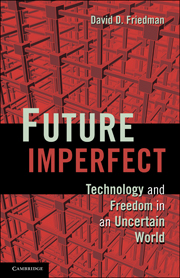2 - Living with Change
Published online by Cambridge University Press: 18 August 2009
Summary
New technologies change what we can do. Sometimes they make what we want to do easier. After writing a book with a word processor, one wonders how it was ever done without one. Sometimes they make what someone else is doing easier – and make it harder for us to prevent him from doing it. Enforcing copyright law became more difficult when photo typesetting made the cost of producing a pirated edition lower than the cost of the authorized edition it competed with, and more difficult again when inexpensive copying put the tools of piracy in the hands of any college professor in search of reading material for his students. As microphones and video cameras become smaller and cheaper, preventing other people from spying on me becomes harder.
The obvious response is to try to keep doing what we have been doing. If that is easier, good. If it is harder, too bad. The world must go on, the law must be enforced. Let justice be done, though the sky fall.
Obvious – and wrong. The laws we have, the ways we do things, are not handed down from heaven on tablets of stone. They are human contrivances, solutions to particular problems, ways of accomplishing particular ends. If technological change makes a law hard to enforce, the best solution is sometimes to stop enforcing it. There may be other ways of accomplishing the same end – including some enabled by the same technological change.
- Type
- Chapter
- Information
- Future ImperfectTechnology and Freedom in an Uncertain World, pp. 12 - 28Publisher: Cambridge University PressPrint publication year: 2008



